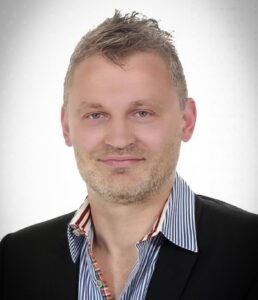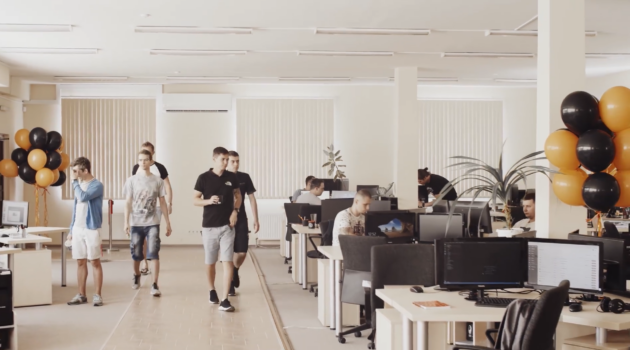What occurred after a Moscow-born Seattle tech CEO closed a giant Russian operation in solidarity with Ukraine
Sergei Dreizin is co-founder and CEO of software engineering company Akvelon, based in Bellevue, Wash. Born and raised in Moscow, he moved to the U.S. in 1992, after the Soviet Union’s collapse, getting his computer science degree from the University of Minnesota before going to work for Microsoft in the Seattle area.

But he maintained personal connections to Russia, and Akvelon established a large engineering operation in the country — numbering about 800 people, or more than half the company’s workforce. Akvelon had offices in three Russian cities: Kazan, Yaroslavl, and Ivanovo.
Akvelon also has 300 people in Ukraine. Its biggest office is in Kharkiv, where Akvelon co-founder and COO Constantine Korovkin studied computer science. Kharkiv has come under heavy attack due to its proximity to the Russian border.
On March 11, Akvelon shut down its operations in Russia following the Russian invasion of Ukraine. But that was just the beginning of the story, as Dreizin explained in a recent interview.
Continue reading for highlights, edited for clarity and length.
Listen to the full discussion on the GeekWire Podcast below, or subscribe to GeekWire in Apple Podcasts, Google Podcasts, Spotify or wherever you listen.
What caused you to make the business decision that you did?
Sergei Dreizin: It became painfully evident that the autocracy had become tyranny. I still remember the Soviet Union, and I know how it works, what the next step is going to be. So we made the decision to shut down Russia and relocate everybody who is willing and able to relocate to other countries.
What was the immediate impact when you shut down the three Russian offices?
Shock. The people who work for us, they’re mostly in their 30s, so they grew up after the Soviet Union had fallen apart, and they have zero personal knowledge of what it’s like to live in a Soviet Union-like country. It’s really hard to convince them that things are actually going to get worse. And it’s going to get progressively worse in the direction of closed borders, and so on. Some of them are electing to stay behind.
So what has happened to those 800 folks?
We have about 60% of people who have elected to move and about 40% of people who haven’t. … Again, they don’t remember, with the Soviet Union, you couldn’t just go and travel somewhere. You had to get an exit visa. Eventually it will happen [in Russia]. Because if you control the narrative, you have to prevent people from going to other countries and seeing how it really is.
For those employees who have left for other countries, do you think they’re looking at this as a temporary or permanent relocation?
I think everybody hopes it’s temporary. But at the same time, them being smart people, I think they realize, until the people in charge in Russia change, it’s not going to change, it’s only going to get worse.
And then for that 40% of the workforce that stayed, are they technically still Akvelon employees?
No, we don’t work in Russia anymore. We believe very strongly that when a tyrant loses a war, and I’m sure it’s going to happen, all the money that they can get will go into two things: repressions of their internal population, and building more weapons. So that’s what’s going to happen in Russia, and we don’t want to be part of it. Absolutely not.
What’s the status of your workforce in Ukraine?
In Ukraine, we have a few offices, but the biggest office is in Kharkiv. The city has been bombarded indiscriminately using heavy weaponry. All of our folks who could leave have left. We still have people who stayed behind who are basically fighting either in the military or in militias. And we have people who stayed back, volunteering to help either in medical or however they can. But most folks have moved to Western Ukraine. We’re paying everybody.

What has this done to your business?
Most of the clients are extremely supportive, down to telling us, invoice us even if you don’t work. Some clients actually have given us extra money to help relocation efforts. We left some clients, because they said, well, we’ll be fine in Russia, we don’t care. So those clients we parted ways with. But most clients are extremely supportive, ranging from Microsoft to big companies to small companies, they have all been great.
Has there been a disruption in timelines on projects?
Yeah, there’s obviously been projects that we’ve fallen behind on. If you think about a 40% attrition rate, we lost close to 300 people. It’s interesting, because a lot of the folks who left Russia worked for internal companies, so there’s a flood of people in Armenia and Georgia who are looking for jobs. We’re probably hiring a hundred people a month, maybe more. But there’s definitely disruption.
Where do you think it’s going to go from here?
If in 2008, when Putin invaded Georgia, or 2014, when Crimea got snatched, there was a response like today, this would have not happened. But any capitalism is cynical, right? So the big question is, how much endurance do the sanctions have.
The reality is, the Russia that I knew and loved ceased to exist on the 24th of February. This is a different country, and you can start thinking about it in the sense of Germany in ’39 or ’38. And the people who live there, most of them are brainwashed to the point where it might take years to unbrainwash it.
What a lot of Americans don’t realize is that this is not a war that just happened somewhere else. It’s not Somalia. It’s not even Iraq. It’s people with the ability to destroy the world.
What kind of takeaways would you want to put out there for the larger community, especially in the business and tech community?
I would really hope that people actually spend an hour or two and go research. Type in Bucha, type in War in Ukraine, and see what’s going on. It’s not a limited conflict. It’s not a disagreement between two Slavic countries. It’s a real war. There’s real atrocities, there’s potentially genocide going on, there’s children being killed.
I think that if people informed themselves, they would realize the scale of destruction and scale of what’s going on, and then they probably would want to do something about it.
See this post for more information and links to local Ukrainian aid organizations, published by Dreizin’s Akvelon co-founder, Constantine Korovkin.
Conclusion: So above is the What occurred after a Moscow-born Seattle tech CEO closed a giant Russian operation in solidarity with Ukraine article. Hopefully with this article you can help you in life, always follow and read our good articles on the website: Doshared.com




